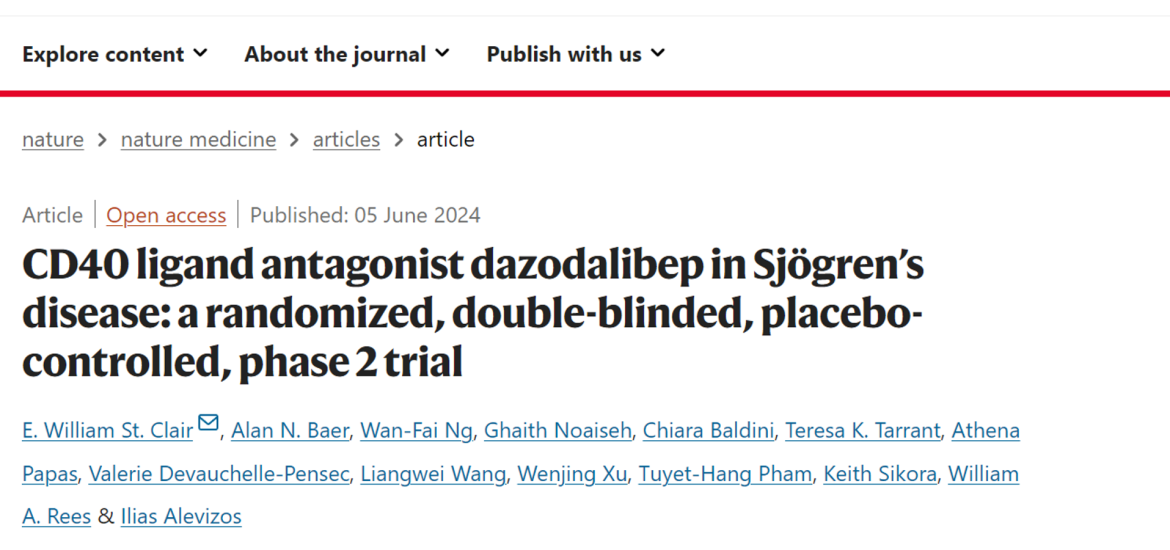
St. Clair EW, Baer AN, Ng WF, Noaiseh G, Baldini C, Tarrant TK, Papas A, Devauchelle-Pensec V, Wang L, Xu W, Pham TH, Sikora K, Rees WA, Alevizos I. CD40 ligand antagonist dazodalibep in Sjögren’s disease: a randomized, double-blinded, placebo-controlled, phase 2 trial. Nat Med |LS|Internet|RS|. 2024 Jun 5. DOI: 10.1038/s41591-024-03009-3
Sjögren’s disease (SjD) is a chronic, systemic autoimmune disease with no approved disease-modifying therapies. Dazodalibep (DAZ), a novel nonantibody fusion protein, is a CD40 ligand antagonist that blocks costimulatory signals between T and B cells and antigen-presenting cells, and therefore may suppress the wide spectrum of cellular and humoral responses that drive autoimmunity in SjD. This study was a phase 2, randomized, double-blinded, placebo (PBO)-controlled trial of DAZ with a crossover stage in two distinct populations of participants with SjD. Population 1 had moderate-to-severe systemic disease activity and population 2 had an unacceptable symptom burden and limited systemic organ involvement. All participants had a diagnosis of SjD, with 21.6% and 10.1% having an associated connective tissue disease (rheumatoid arthritis or systemic lupus erythematosus) in populations 1 and 2, respectively. The remaining participants would be considered as having primary Sjögren’s syndrome.
The primary endpoint for population 1 (n = 74) was the change from baseline in the European League Against Rheumatism Sjögren’s Syndrome Disease Activity Index at day 169. The primary endpoint for population 2 (n = 109) was the change from baseline in the European League Against Rheumatism Sjögren’s Syndrome Patient Reported Index at day 169. The primary endpoints (least squares mean ± standard error) were achieved with statistical significance for both population 1 (DAZ, −6.3 ± 0.6; PBO, −4.1 ± 0.6; P = 0.0167) and population 2 (DAZ, −1.8 ± 0.2; PBO, −0.5 ± 0.2; P = 0.0002). DAZ was generally safe and well tolerated. Among the most frequently reported adverse events were COVID-19, diarrhea, headache, nasopharyngitis, upper respiratory tract infection, arthralgia, constipation and urinary tract infection. CXCL13 and rheumatoid factor levels were significantly reduced on treatment. In summary, DAZ appears to be a potential new therapy for SjD and its efficacy implies an important role for the CD40/CD40 ligand pathway in its pathogenesis.
Validation studies are underway with a phase 3 trial. In parallel, other studies in Sjögren’s targeting CD40 are positivie, putting the spotlight on this potential pathway and hope for marketing approval within a few years.




